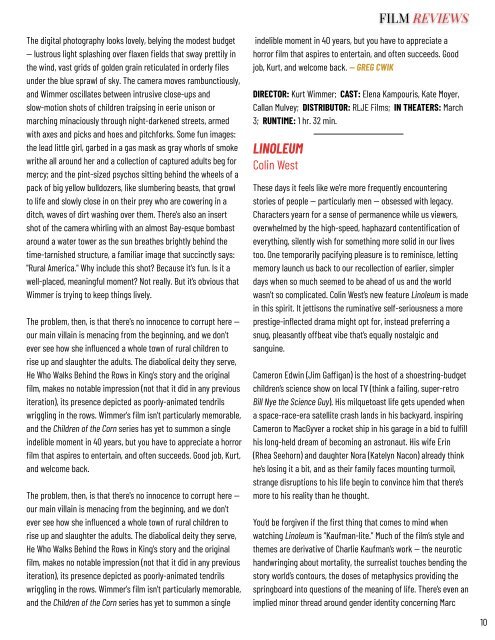You also want an ePaper? Increase the reach of your titles
YUMPU automatically turns print PDFs into web optimized ePapers that Google loves.
FILM REVIEWS<br />
The digital photography looks lovely, belying the modest budget<br />
<strong>—</strong> lustrous light splashing over flaxen fields that sway prettily in<br />
the wind, vast grids of golden grain reticulated in orderly files<br />
under the blue sprawl of sky. The camera moves rambunctiously,<br />
and Wimmer oscillates between intrusive close-ups and<br />
slow-motion shots of children traipsing in eerie unison or<br />
marching minaciously through night-darkened streets, armed<br />
with axes and picks and hoes and pitchforks. Some fun images:<br />
the lead little girl, garbed in a gas mask as gray whorls of smoke<br />
writhe all around her and a collection of captured adults beg for<br />
mercy; and the pint-sized psychos sitting behind the wheels of a<br />
pack of big yellow bulldozers, like slumbering beasts, that growl<br />
to life and slowly close in on their prey who are cowering in a<br />
ditch, waves of dirt washing over them. There's also an insert<br />
shot of the camera whirling with an almost Bay-esque bombast<br />
around a water tower as the sun breathes brightly behind the<br />
time-tarnished structure, a familiar image that succinctly says:<br />
"Rural America." Why include this shot? Because it's fun. Is it a<br />
well-placed, meaningful moment? Not really. But it’s obvious that<br />
Wimmer is trying to keep things lively.<br />
The problem, then, is that there's no innocence to corrupt here <strong>—</strong><br />
our main villain is menacing from the beginning, and we don't<br />
ever see how she influenced a whole town of rural children to<br />
rise up and slaughter the adults. The diabolical deity they serve,<br />
He Who Walks Behind the Rows in King's story and the original<br />
film, makes no notable impression (not that it did in any previous<br />
iteration), its presence depicted as poorly-animated tendrils<br />
wriggling in the rows. Wimmer's film isn't particularly memorable,<br />
and the Children of the Corn series has yet to summon a single<br />
indelible moment in 40 years, but you have to appreciate a horror<br />
film that aspires to entertain, and often succeeds. Good job, Kurt,<br />
and welcome back.<br />
The problem, then, is that there's no innocence to corrupt here <strong>—</strong><br />
our main villain is menacing from the beginning, and we don't<br />
ever see how she influenced a whole town of rural children to<br />
rise up and slaughter the adults. The diabolical deity they serve,<br />
He Who Walks Behind the Rows in King's story and the original<br />
film, makes no notable impression (not that it did in any previous<br />
iteration), its presence depicted as poorly-animated tendrils<br />
wriggling in the rows. Wimmer's film isn't particularly memorable,<br />
and the Children of the Corn series has yet to summon a single<br />
indelible moment in 40 years, but you have to appreciate a<br />
horror film that aspires to entertain, and often succeeds. Good<br />
job, Kurt, and welcome back. <strong>—</strong> GREG CWIK<br />
DIRECTOR: Kurt Wimmer; CAST: Elena Kampouris, Kate Moyer,<br />
Callan Mulvey; DISTRIBUTOR: RLJE Films; IN THEATERS: March<br />
3; RUNTIME: 1 hr. 32 min.<br />
LINOLEUM<br />
Colin West<br />
These days it feels like we’re more frequently encountering<br />
stories of people <strong>—</strong> particularly men <strong>—</strong> obsessed with legacy.<br />
Characters yearn for a sense of permanence while us viewers,<br />
overwhelmed by the high-speed, haphazard contentification of<br />
everything, silently wish for something more solid in our lives<br />
too. One temporarily pacifying pleasure is to reminisce, letting<br />
memory launch us back to our recollection of earlier, simpler<br />
days when so much seemed to be ahead of us and the world<br />
wasn’t so complicated. Colin West’s new feature Linoleum is made<br />
in this spirit. It jettisons the ruminative self-seriousness a more<br />
prestige-inflected drama might opt for, instead preferring a<br />
snug, pleasantly offbeat vibe that’s equally nostalgic and<br />
sanguine.<br />
Cameron Edwin (Jim Gaffigan) is the host of a shoestring-budget<br />
children’s science show on local TV (think a failing, super-retro<br />
Bill Nye the Science Guy). His milquetoast life gets upended when<br />
a space-race-era satellite crash lands in his backyard, inspiring<br />
Cameron to MacGyver a rocket ship in his garage in a bid to fulfill<br />
his long-held dream of becoming an astronaut. His wife Erin<br />
(Rhea Seehorn) and daughter Nora (Katelyn Nacon) already think<br />
he’s losing it a bit, and as their family faces mounting turmoil,<br />
strange disruptions to his life begin to convince him that there’s<br />
more to his reality than he thought.<br />
You’d be forgiven if the first thing that comes to mind when<br />
watching Linoleum is “Kaufman-lite.” Much of the film’s style and<br />
themes are derivative of Charlie Kaufman’s work <strong>—</strong> the neurotic<br />
handwringing about mortality, the surrealist touches bending the<br />
story world’s contours, the doses of metaphysics providing the<br />
springboard into questions of the meaning of life. There’s even an<br />
implied minor thread around gender identity concerning Marc<br />
10
















